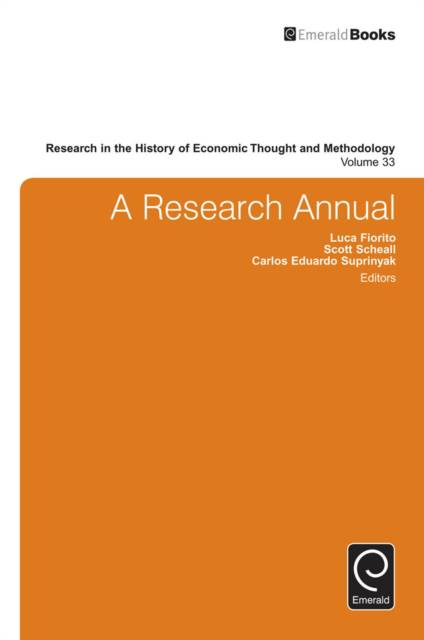
- Afhalen na 1 uur in een winkel met voorraad
- Gratis thuislevering in België vanaf € 30
- Ruim aanbod met 7 miljoen producten
- Afhalen na 1 uur in een winkel met voorraad
- Gratis thuislevering in België vanaf € 30
- Ruim aanbod met 7 miljoen producten
Zoeken
A Research Annual
€ 275,45
+ 550 punten
Omschrijving
The Research in the History of Economic Methodology (RHETM) 33, the first under the new editorial team, includes original research from preeminent scholars in the field. Topics range from "What to tell a Graduate Course in Macroeconomics about Keynes" (by Keynes scholar Robert W. Dimand), "American Institutionalism After 1945" (by 2014 History of Economics Society Distinguished Fellow Malcolm Rutherford), an archival investigation on the nature and extent of Keynes' anti-Semitism (by co-editor Luca Fiorito), "Bounded Rationality and Bounded Individuality" (by leading methodologist John B. Davis), "The Genealogy of the Labor Hoarding Concept" (by current History of Economics Society President-elect Jeff E. Biddle), the role of "Economic Man" in the writings of Alfred Marshall and the Chicago School (by Steven G. Medema, author of The Hesitant Hand: Taming Self-Interest in the History of Economic Ideas), and "Malthus, Utopians, and Economists" (by former History of Economics Society President J. Daniel Hammond). RHETM is one of the oldest and most respected publications in the field, and the Vol 33 crucial for economists, methodologists, and historians of the social sciences.
Specificaties
Betrokkenen
- Uitgeverij:
Inhoud
- Aantal bladzijden:
- 248
- Taal:
- Engels
- Reeks:
- Reeksnummer:
- nr. 33
Eigenschappen
- Productcode (EAN):
- 9781784418588
- Verschijningsdatum:
- 9/04/2015
- Uitvoering:
- Hardcover
- Formaat:
- Genaaid
- Afmetingen:
- 157 mm x 231 mm
- Gewicht:
- 498 g

Alleen bij Standaard Boekhandel
+ 550 punten op je klantenkaart van Standaard Boekhandel
Beoordelingen
We publiceren alleen reviews die voldoen aan de voorwaarden voor reviews. Bekijk onze voorwaarden voor reviews.






